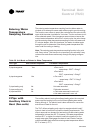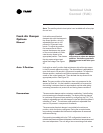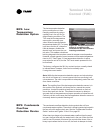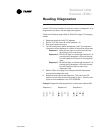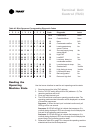
UNT-IOM-6 97
Terminal Unit
Control (TUC)
The low temperature detection
option protects the unit from
freezing conditions by using a
capillary line in the coil fins to
detect freezing conditions. The
TUC uses the low temperature
sensor with a normally open
valve. When the sensor detects
temperatures below 36° F, a binary
input turns the fan off, closes the
fresh air damper, disables the
electric heat, and opens the con-
trol valve. This creates a shutdown
latching diagnostic that requires a reset to resume normal operation.
However, normal operation cannot resume until the water temperature
rises to 44° F. See Figure 31.Low temperature detection is active
even when the unit is off, but the TUC must remain powered for it to
be functional.
The factory configures the 24V dry contact input as normally closed
to indicate alarm. However, it also can be normally open
if using the correct switch.
Note: While the low temperature detection sensor can help minimize
the risk of coil freeze-up, it cannot prevent this from occurring in all
circumstances. The user is responsible to adequately protect the unit
from freeze conditions.
Note: The capillary line of the low temperature detection sensor is in
the section of the hydronic coil above the fan, nearest the control
panel box. Locate the outside air wall box or ductwork so fresh air
has a direct path into the fan. This allows the sensor to detect an
accurate fresh air temperature and proper operation of a dual fan unit.
Failure to do this could cause the low temperature detection sensor to
incorrectly detect a potential freezing coil.
The condensate overflow detection device protects the unit from
condensate water overflow. The switch is a float-type device located in
the fan-coil units auxiliary drain pan. See the Condensate Overflow
Switch section and Figures 12 and 13 on page 26.
When there is a danger of condensate water overflow from the auxil-
iary pan, the float rises with the water level in the pan. When the float
rises to over 50 percent of its travel, the control valve closes. Also, a
binary input causes the fan to turn off, the fresh air damper to close,
Figure 31. The low temperature
sensor is a capillary tube
inserted into the coil to detect
freezing conditions.
BIP3: Condensate
Overflow
Detection Device
BIP4: Low
Temperature
Detection Option








